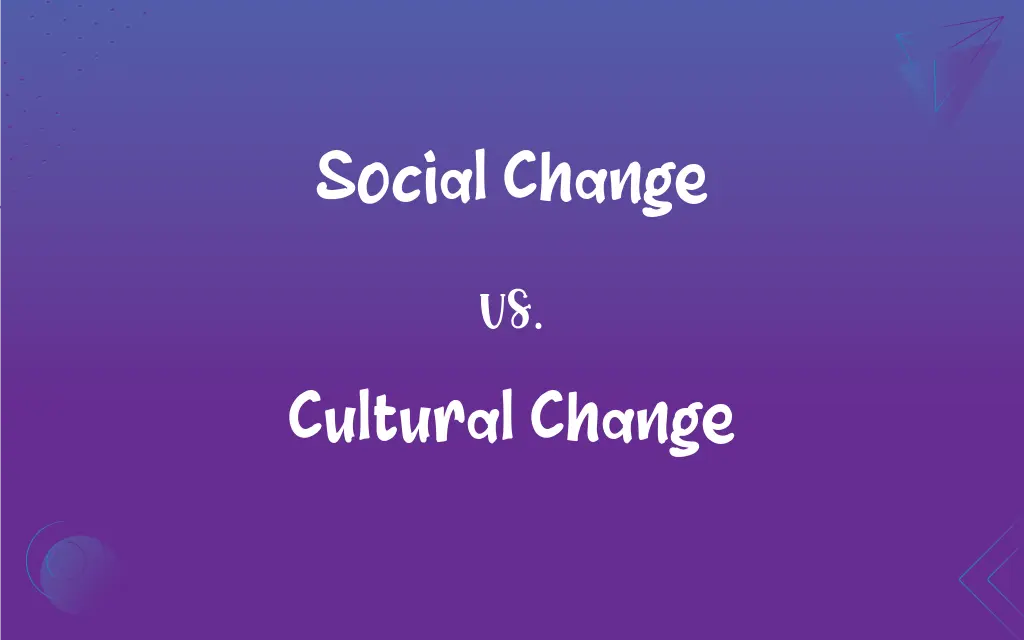Social Change vs. Cultural Change: What's the Difference?
Edited by Aimie Carlson || By Harlon Moss || Updated on October 4, 2023
Social change involves alterations in the societal order, while cultural change pertains to shifts in shared beliefs, values, norms, and practices within a society or group.

Key Differences
Social change fundamentally pertains to the transformations in societal structures and practices across time. It’s inclusive of changes in policies, social norms, and societal behavior which impact the whole society or specific sections of it. On the other hand, cultural change specifically dives into the collective mental and emotional shifts. It involves alterations in beliefs, values, norms, and practices that are shared among a group or society, establishing a unique identity for that particular community.
Understanding social change often involves looking at the alterations in social structures, roles, and functions of institutions, be they political, educational, or legal. It encompasses large-scale changes in society and can manifest as shifts in power dynamics, economic structures, and social norms. Conversely, cultural change transcends into the very essence of a group’s shared way of life. It subtly or significantly alters the rituals, traditions, symbols, languages, and norms that a group or society adheres to and identifies with.
One notable aspect of social change is its potential to be tangible and quantifiable, as it might involve visible shifts in social structures or policies. Such changes can often be statistically measured and analyzed, providing a palpable benchmark for observing development or regression. Cultural change, meanwhile, might navigate through the intangible spectrum, wherein alterations in beliefs, ideologies, and values may not always be readily observable or quantifiable but could gradually permeate through various facets of a society.
Social change might be more often directed and intentional, driven by collective action, policies, or systematic efforts aimed at establishing a shift in societal norms or structures. It might be associated with conscious efforts such as movements or legislations. Cultural change, although it can be intentional, often happens organically over time, weaving through generations and possibly emanating from shifts in collective perspectives, innovations, or external influences.
Furthermore, the spectrum of social change may encompass a variety of fields including, but not limited to, technology, economy, and legislation, wherein changes are frequently implemented to enhance societal development. Cultural change, while it can influence and be influenced by social change, shifts more towards the internal compass of a society, reshaping how its members think, value, and behave in various contexts, ultimately altering their collective identity and way of life.
ADVERTISEMENT
Comparison Chart
Definition
Involves shifts in societal structures and practices.
Encompasses changes in shared beliefs, values, and norms.
Tangibility
Often tangible and quantifiable.
Might be intangible and harder to quantify.
Intentionality
Can be more directed and intentional.
Can be organic and subtly permeating.
Manifestation
Visible in policies, social norms, and structures.
Visible in altered beliefs, traditions, and behaviors.
Influence & Affected By
Can influence and be influenced by cultural change.
Can influence and be affected by social change.
ADVERTISEMENT
Social Change and Cultural Change Definitions
Social Change
A process where society moves from one cultural phase to another.
The Industrial Revolution is an example of dramatic social change.
Cultural Change
Changes in a society's arts, customs, and social institutions.
The digital age has brought about cultural change in how we consume art and literature.
Social Change
A transformation in societal structures and norms.
The women's suffrage movement brought significant social change.
Cultural Change
A shift in the way a society understands and interacts with its environment.
The acceptance of same-sex marriage in many countries reflects a profound cultural change.
Social Change
The evolution or alteration in societal behaviors over time.
The rise of social media has driven rapid social change in communication habits.
Cultural Change
The transformation of a society's traditions, rituals, and way of life.
Migration and mixing of populations can lead to vibrant cultural change.
Social Change
The adaptation or reformation of societal characteristics.
Environmental awareness is leading to social change towards sustainable practices.
Cultural Change
The evolution in shared beliefs, norms, and values of a society.
The spread of global entertainment has accelerated cultural change in many regions.
Social Change
Shifts in the collective attitudes of a population.
Civil rights movements in the 1960s spurred profound social change in the U.S.
Cultural Change
Modifications in the expressive symbols of a society.
The rise in tattoos and body art signifies a cultural change in beauty standards.
FAQs
What role does technology play in social change?
Technology often accelerates social change by introducing new ways of communication, work, and leisure.
What is social change?
Social change refers to the transformation in societal structures, norms, and behaviors over time.
What are some causes of social change?
Economic factors, technological innovations, political shifts, and social movements can all drive social change.
Can social change be both positive and negative?
Yes, social change can bring about progress and improvements, but it can also lead to regressions or undesirable shifts.
How can societies prepare for inevitable social and cultural changes?
Open dialogue, education, and fostering adaptability and resilience can help societies navigate and benefit from changes.
How does globalization influence cultural change?
Globalization fosters the mixing of cultures, leading to the adoption, adaptation, or rejection of different cultural elements.
Can cultural change be forced?
While it can be influenced by external factors or policies, genuine and lasting cultural change often emerges organically from within the society.
How do migration and immigration impact social and cultural change?
Migration introduces new cultural elements and societal perspectives, often leading to both social and cultural changes in the affected regions.
How does religion influence cultural change?
Religion can both drive and resist cultural change based on religious beliefs, practices, and interpretations.
Are there universal factors that drive social and cultural changes globally?
While specific factors might vary, elements like technological advancements, economic shifts, and environmental challenges often drive change globally.
Why is understanding cultural change important?
Recognizing cultural change helps societies adapt, address challenges, and make informed decisions.
Can societies resist social or cultural change?
While societies can be resistant to change due to traditions and norms, external influences and internal dynamics often drive eventual change.
How do social and cultural changes impact the economy?
They can influence consumer behavior, labor markets, and the overall economic landscape.
What is cultural change?
Cultural change involves the evolution or transformation of shared beliefs, norms, values, and traditions within a society.
Can individuals initiate social and cultural change?
Absolutely, individuals, especially when united in groups or movements, can be powerful agents of change.
How does social change differ from cultural change?
While social change focuses on shifts in societal behaviors and structures, cultural change emphasizes the evolution in shared beliefs, values, and traditions of a society.
How do education and media influence social and cultural change?
They play pivotal roles in shaping perceptions, disseminating information, and influencing collective behaviors and beliefs.
Are social and cultural changes always slow?
Not necessarily; some changes can be rapid, especially with strong catalysts like technological advancements.
Can social or cultural change reverse?
Yes, societal shifts can lead to a reversion or modification of previous changes.
What's an example of social change in history?
The Civil Rights Movement in the U.S. during the 1960s is a prime example of transformative social change.
About Author
Written by
Harlon MossHarlon is a seasoned quality moderator and accomplished content writer for Difference Wiki. An alumnus of the prestigious University of California, he earned his degree in Computer Science. Leveraging his academic background, Harlon brings a meticulous and informed perspective to his work, ensuring content accuracy and excellence.
Edited by
Aimie CarlsonAimie Carlson, holding a master's degree in English literature, is a fervent English language enthusiast. She lends her writing talents to Difference Wiki, a prominent website that specializes in comparisons, offering readers insightful analyses that both captivate and inform.































































